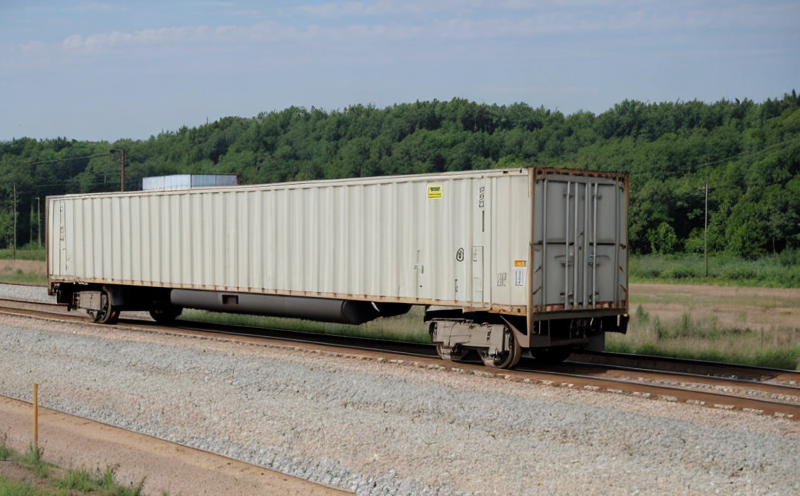EN 14363 Running Dynamics Testing of Freight Wagons
The European Standard EN 14363 provides a comprehensive framework for testing the running dynamics of freight wagons. This standard is crucial as it ensures that railway transport systems are safe, efficient, and compliant with international regulations. The test evaluates how wagons perform under various conditions to ensure they can safely navigate complex tracks and varying loads without compromising passenger or cargo safety.
The primary focus of EN 14363 testing is on the dynamic stability of freight wagons during operation. This includes assessing the wagon’s behavior in different speed ranges, acceleration profiles, braking dynamics, and track conditions. The test aims to identify potential issues that could lead to derailment or other safety hazards. By adhering to this standard, railway operators can ensure their fleet meets stringent European Union requirements for safe and reliable freight transportation.
The testing process involves several key steps, including specimen preparation, instrumentation setup, data acquisition, and post-test analysis. Specimens are typically full-scale models of the wagons being tested. The test setup includes a high-speed track that simulates real-world conditions as closely as possible. Sensors placed along the track measure acceleration, deceleration rates, lateral forces, and other critical parameters during the wagon’s movement.
Data analysis plays a crucial role in this testing process. After each run, collected data is analyzed to determine if it meets specified limits set by EN 14363. If any parameter exceeds these limits, further investigation into the cause of non-compliance is necessary. This might involve reconfiguring certain aspects of the wagon’s design or adjusting operational procedures.
The results from these tests are critical for several reasons. They help ensure regulatory compliance, enhance safety standards across European railways, and provide valuable insights that can lead to improvements in both existing models and future designs. Compliance with EN 14363 is mandatory for all freight wagons operating within the EU, ensuring a high level of safety and reliability.
| Test Parameter | Description |
|---|---|
| Acceleration Profile | The rate at which the wagon increases its speed during acceleration phases. |
| Deceleration Rate | The rate of reduction in velocity when braking is applied. |
| Lateral Forces | Forces acting perpendicular to the direction of travel that can contribute to derailment risks. |
| Track Conditions | The state of the track surface, including curvature and smoothness, which affect wagon performance. |
Industry Applications
- Railway operators looking to comply with European Union regulations for freight transport.
- Manufacturers seeking to ensure their wagons meet stringent safety standards.
- Transportation companies interested in enhancing the reliability and safety of their fleet.
The application of EN 14363 is broad, covering various types of freight wagons used in diverse scenarios. From high-speed cargo trains to slower regional transport systems, this standard ensures all models undergo rigorous testing that reflects real-world operating conditions.
Industry stakeholders can benefit significantly from adhering to this standard. Not only does it help maintain regulatory compliance but also improves overall safety and operational efficiency. By investing in running dynamics testing according to EN 14363, companies demonstrate their commitment to quality and safety, which is increasingly important in the competitive global market.
Eurolab Advantages
As a leading provider of railway and transportation testing services, Eurolab offers unparalleled expertise in EN 14363 compliance. Our state-of-the-art facilities are equipped with the latest technology to ensure accurate and reliable test results.
- Expertise in all aspects of freight wagon running dynamics testing.
- Comprehensive understanding of European standards and regulations.
- Advanced instrumentation for precise data collection and analysis.
We pride ourselves on our ability to provide personalized service tailored to the specific needs of each client. Whether you are a small manufacturer or a large railway operator, Eurolab is committed to helping you achieve your testing objectives efficiently and effectively.
Why Choose This Test
The running dynamics test according to EN 14363 is essential for several reasons. Firstly, it ensures that freight wagons meet the high safety standards set by European Union regulations. Secondly, it helps identify potential issues early in the development or maintenance process, preventing costly delays and repairs later on.
Additionally, compliance with this standard can enhance a company’s reputation within the industry. Demonstrating adherence to international best practices shows that your organization prioritizes quality and safety above all else. This is particularly important given the increasing emphasis on sustainability and efficiency in modern transportation systems.





